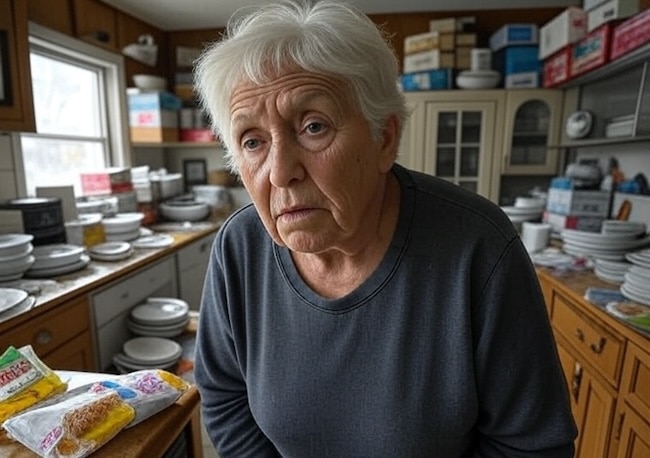
Is your aging parent’s home overflowing with clutter? Are they refusing to part with broken items or expired food? Hoarding behaviors in seniors often stem from deeper issues like dementia, trauma, or anxiety, and harsh interventions can backfire.

In this guide, you’ll learn:
✅ 5 subtle red flags (beyond just clutter)
✅ How to start a productive conversation (without conflict)
✅ Step-by-step decluttering strategies that respect their emotions
✅ When to seek professional help
Prevent Hoarding In Seniors By Reducing Clutter
Hoarding often starts as harmless clutter in a few spots around the house. But for some older adults, that clutter can become a hoarding problem. One way to prevent this is to reduce clutter, especially when it starts to cause safety issues.
Hoarding causes dangers like increased fall risk, preventing emergency workers from helping your senior, and unsanitary living conditions. It could also be a sign of a serious condition like Alzheimer’s or dementia.
Is It Hoarding? 5 Early Warning Signs
Hoarding disorder is different from ordinary clutter. Watch for:
- “No empty surfaces” syndrome – Stacks of mail, clothes, or containers covering tables, chairs, and floors.
- Extreme emotional attachment – Panic at discarding expired food or broken items.
- Denial of safety risks – Ignoring fire hazards, moldy food, or blocked exits.
- Social isolation – Avoiding visitors due to embarrassment.
- Dementia-related hoarding – Collecting items excessively but forgetting why.
🔍 Hoarding isn’t about the stuff—it’s about fear. Seniors aren’t being ‘difficult’; they’re trying to feel safe. — Dr. Randy Frost, Hoarding Disorder Expert


How to Help (Without the Backlash)
Do’s:
✔ Start small – Focus on one drawer, not the whole house.
✔ Ask, don’t demand – “Could we tidy this corner so your walker fits?”
✔ Validate emotions – “I know this is hard. Let’s keep what matters most.”
Don’ts:
✖ Throw things away secretly – Breaks trust and increases anxiety.
✖ Shame or criticism – “How can you live like this?” worsens things.
✖ Rush the process – Decluttering may take months.
💡 For dementia-related hoarding: Use “chunking” (small sections at a time) and keep favorite items visible.
When to Call a Professional
Seek help if:
⚠ The home has structural damage, pests, or rotting food.
⚠ Your loved one neglects hygiene or medical care due to clutter.
⚠ Family arguments escalate with no progress.
Resources:
National Association of Professional Organizers (NAPO) – Find senior specialists.
Institute for Challenging Disorganization (ICD) – Hoarding-trained experts.
Bonus: Scripts for Tough Conversations
💬 “I’m worried about your safety. Could we clear just this path together?”
💬 “Let’s keep your favorite things and donate the rest to people in need.”
You might also like:
— How to Help Seniors Who Are Hoarders
— Declutter Your Older Adult’s Living Space
— Get Rid of Junk Mail to Prevent Elder Fraud


Connie Chow
Connie was a hands-on caregiver for her grandmother for 20 years. (Grandma made it to 101 years old!) She knows how challenging, overwhelming, and all-consuming caring for an older adult can be. She also knows how important support is — especially in the form of practical solutions, valuable resources, and self-care tips.






